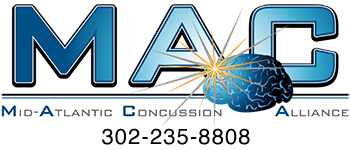
by Margo Trott Collins
on October 30, 2024
Moments after a head injury, it can be difficult for the layperson to know what signs to look for to tell if a concussion has happened. Even for athletic trainers and coaches, it can be difficult. Sadly, this can result in delayed medical treatment for the concussion or other traumatic brain injury (TBI). This is
Read more

by Margo Trott Collins
on August 29, 2024
Concussions are all too common, and all too often written off as minor injuries. In the past it was custom for doctors to quote old text books that “most concussions will clear up in about two weeks,” but more current research and the latest medical literature seems to prove otherwise. Research looking at persistent post-concussive
Read more

by Margo Trott Collins
on July 18, 2024
By guest blogger Dr. Abby Baldwin, PT, DPT, OCS, SCS, COMT, ITPT, GCS, AIB-VR THE ACL CRISIS: It’s all in your head. New research shows that concussions could be antecedents of ACL tears in contact sports. Can it be prevented? It’s almost a weekly headline for a women’s basketball or soccer player to announce an
Read more

by Nicole Schaller
on May 17, 2024
In honor of National Mental Health Awareness Month, we wanted to share a set of statistics from an eye-opening report published in JAMA Network Open : Approximately 15% to 30% of individuals with a history of concussion will present with persistent post-concussive symptoms (PPCS) Studies show that people with PPCS have four-fold greater odds of
Read more

by Margo Trott Collins
on April 28, 2024
Imagine living with no screen time for a few days. Could you to do it? These days, computers, smart phones, gaming consoles, TV and other electronic devices are such an integral part of our lives. This is especially true with teens and young adults. That why there’s always been a concern among medical professionals who
Read more

by Nicole Schaller
on February 24, 2023
Over the last decade, numerous studies tested the relationship between patients diagnosed with attention-deficit/hyperactivity disorder (ADHD) and their recovery with concussions. Both ADHD and concussion share some symptoms, such as loss of focus, which led researchers into wanting to learn more about the overlap between the two and whether traumatic brain injury (TBI) recovery was
Read more

by Nicole Schaller
on April 22, 2021
“Time is of the essence” could not be truer in the case of concussions. A recent meta-analysis study in Sports Medicine found that athletes who initially delayed reporting or continued to play with a concussion took longer to recover than athletes who immediately reported concussion symptoms and removed from play. The study adds to growing support
Read more

by Nicole Schaller
on February 24, 2021
We at MAC Alliance use a wide array of concussion and brain health testing tools to screen, diagnosis and treat brain injuries. They include neurocognitive brain testing, EEG technology, infrared eye-tracking screening and other advanced tools. Now, according to some new groundbreaking research, we may someday be adding a saliva test for concussions to our
Read more

by Margo Trott Collins
on December 16, 2020
With temperatures plummeting in many places in the country, including our mid-Atlantic area, here’s a timely topic: a possible new treatment for mild traumatic brain injury (TBI) called therapeutic brain cooling for concussions. Cool is…Well…Very Cool! Applying cold to an injury is not a new concept. Athletes do it all the time. And lots of
Read more

by antrimweb
on September 10, 2020
We have often said that concussions can be tricky to spot because they have many invisible symptoms that aren’t as obvious as the signs of many other injuries, such as a broken arm or sprained ankle. Traumatic brain injuries (TBIs) aren’t easily detected by many of the tools we normally use to assess injuries: MRIs
Read more

















